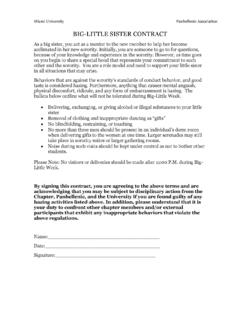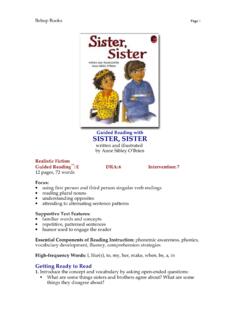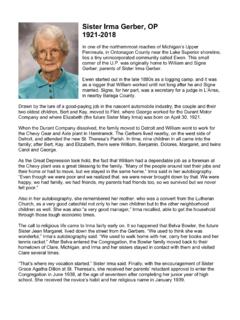Transcription of Sisterly Affection, Sisterly Competition
1 Sisterly affection , Sisterly Competition :Sibling Rivalry in Jane Austen s Novels by Mary Oakley Strasser But dearest of all to the heart of Jane was her sister Cassandra .. Their Sisterly affection for each other could scarcely be exceeded (Austen-Leigh 1). Considering Jane Austen s particular devotion to her sister, it is all the more remarkable that so few of her characters share similar relationships. Certainly Jane and Elizabeth Bennet and Elinor and Marianne Dashwood are very close. Their Sisterly devotion is obvious in their tender care of each other in illness.
2 However, Louisa and Henrietta Musgrove, Lydia and Kitty Bennet, and Julia and Maria Bertram are not examples of devotion but of rivalry and Competition . Instances of rivalry are more typical of the Sisterly relationships in Jane Austen s novels Persuasion, Pride and Prejudice, and Mansfield Park. Unlike Jane and Cassandra, Sisterly affection for these characters is indeed exceeded. In each pair of sisters , one sister dominates the other in their Competition for affection . In Persuasion, Jane Austen introduces Henrietta and Louisa Musgrove as some of the happiest creatures of [Anne s] [she] envied them.
3 That seemingly perfect good understanding and agreement together, that good-humoured mutual affection (Austen 1234). This Sisterly affection is strained by the arrival of Captain Wentworth, a wealthy naval officer openly seeking a bride, as they compete for his attention. They seemed hardly to have any eyes but for him and acted accordingly, learning everything they could about the lives of naval officers and ensuring that he was frequently included in family gatherings (Austen 1248). The Musgrove family gossip centers upon which sister Captain Wentworth prefers.
4 Anne soon observes that Louisa certainly put more forward for his notice than her sister (Austen 1260). When Charles Hayter, a young man who had been previously courting Henrietta, returns to his home near Uppercross, he is unhappy to find Henrietta interested in Captain Wentworth. With Hayter s return, Henrietta is suddenly forced to reevaluate her feelings. Should she pursue the dashing Captain Wentworth, or should she continue to foster the considerable appearance of attachment to Charles Hayter (Austen 1254)? Louisa, sensing her sister s hesitation, takes action to ensure that Henrietta will soon be unavailable to the capitalizes on her sister s ambivalent feelings and is the principle arranger of the plan to walk to Winthrop, Mr.
5 Hayter s home (Austen 1261). Once there, Louisa manipulates Henrietta into visiting Charles, sure that she will renew their relationship. Louisa then promptly returns to the party on the hill and drew Captain Wentworth away (Austen 1262). Unlike her sister, Louisa shows no hesitation to compete for the affection of Captain Wentworth. John Lauber notes that hardly more than an eager insists on having her way at all costs (Lauber 102). And in this case, the cost is her sister s feelings. While Louisa may genuinely believe that she is acting in her sister s best interest, she also achieves her goal of distracting her Pride and Prejudice, Lydia and Kitty provide another example of sibling rivalry.
6 Their relationship is not so much a feminine Competition for any gentleman s attention, but more a game of follow-the-leader. In their scramble to catch the eyes of the officers and local gentlemen, Kitty plays second fiddle to Lydia. Oliver MacDonagh comments that Lydia dominated affording a deplorable but powerful model of one particular form of ill-reared 2006 Mary Oakley Strasser. All Rights (MacDonagh 6) Mrs. Bennet s maternal negligence contributes to Kitty s submissive role in the form of an inferiority complex that she unwittingly instills in her daughter.
7 Mrs. Bennet breaks one of the basic rules of parenting by openly comparing her daughters. Lizzy is not a bit better than the others; and I am sure she is not half so handsome as Jane, nor half so good-humoured as Lydia (Austen 232). Here, Kitty s qualities do not even earn her mother s consideration. Mrs. Bennet frequently makes such observations about her children, and Mr. Bennet openly favors Lizzy. It is no wonder, then, that Kitty s imposed inferiority causes her to defer to Lydia. As Elizabeth remarks, She [Kitty] will follow wherever Lydia leads (Austen 370).
8 Kitty is willing to follow-the-Lydia-er until the stakes are higher. When Lydia receives an invitation to accompany Mrs. Forster to Brighton, Kitty is not so complacent about her secondary role to Lydia. Wholly inattentive to her sister s feelings, Lydia flew about the house in restless ecstasy (Austen 369). Lydia leaves Kitty in Meryton weep[ing] from vexation and envy (Austen 372). With Lydia s absence, Kitty becomes the primary silly and of the Bennet household (Austen 232). She takes full advantage of her new role by dramatically bemoaning the departure of the regiment and the lost opportunities for sea-bathing.
9 However, Jane Austen gives no indication that Kitty assumes a larger role in Meryton society. Instead of blossoming into a respectable young woman by following the example of her two elder sisters , Kitty sinks into a stupor of Meryton-induced tears and endless re-readings of her sister s letters, which are much too full of lines under the words to be made public (Austen 374). Even after Lydia s scandalous elopement, Kitty continues to compare herself to Lydia and to emulate her behavior, saying, If I should ever go to Brighton, I would behave better than Lydia (Austen 410).
10 Kitty s maturation is hindered by her weak sense of self and her continued willingness to follow Lydia s example. She only reaches her full potential after Lydia moves to the north and Kitty spends most of her time visiting Elizabeth or Jane. Removed from the influence of Lydia s example, she less irritable, less ignorant, and less insipid (Austen 462). Nowhere in Jane Austen s novels is Sisterly Competition more apparent than in Mansfield Park. In describing Maria and Julia Bertram, Jane Austen writes, With no material fault of temper, or difference of opinion, to prevent their being very good friends while their interests were the same, the sisters , under such a trial as this, had not affection or principle enough to make them merciful or just, to give them honour or compassion (Austen 568).









